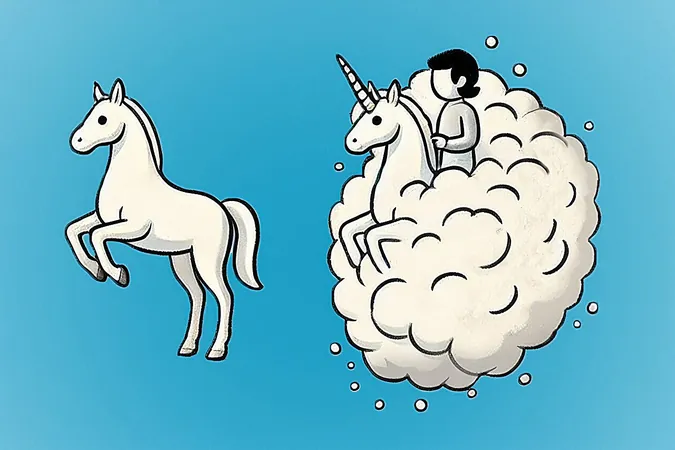
Groundbreaking MRI Discoveries Could Revolutionize Depression Treatment
2025-03-31
Author: Yu
Depression and Its Complexities
Depression remains a global crisis, afflicting millions, yet the complexities surrounding its diagnosis and treatment continue to baffle both experts and sufferers alike. A pivotal study led by Ph.D. candidate Jesper Pilmeyer sheds light on this pervasive mental health condition, revealing dynamic brain patterns through advanced MRI scans that could revolutionize diagnostic accuracy and treatment forecasting.
"Despite affecting approximately 1 in 6 individuals, our understanding of depression still lags significantly behind," Pilmeyer remarks. His research emphasizes that various factors contribute to depression, including genetic predisposition and serotonin regulation—the neurotransmitter linked with feelings of happiness. While antidepressants may alleviate symptoms for some, their effectiveness remains inconsistent across patients.
Pilmeyer, whose background is deeply rooted in Biomedical Engineering, undertook a meticulous investigation into brain abnormalities using MRI technology, exploring how these anomalies could correlate with the progression of depression. His findings, which have just been published in the journal *Psychiatry Research: Neuroimaging*, offer hope for more precise diagnostics and tailored treatment plans.
Revolutionizing Diagnostics with Biomarkers
At the heart of Pilmeyer's research is the concept of biomarkers—quantifiable biological indicators that can provide a more objective diagnosis and a clearer view of individual depression pathways. Currently, mental health assessments are primarily reliant on subjective symptoms like fatigue and anxiety, which can significantly differ among patients. The introduction of MRI-imaged biomarkers aims to establish a standardized, scientific basis for understanding and predicting the evolution of depression.
With functional MRI (fMRI), researchers can monitor active brain regions by tracking blood flow changes, illuminating how various networks communicate internally. By assessing multiple brain features, Pilmeyer and his team hope that this approach will lead to more individualized diagnosis and treatment methodologies.
The Study Design and Patient Interaction
Pilmeyer’s research was uniquely designed in collaboration with the Kempenhaeghe clinic, Philips Research, and GGzE, involving both depressed patients and a healthy control group. Initially, both groups underwent MRI scans to identify contrasting brain patterns and, subsequently, follow-up scans every three months for depressive patients to track symptom progression.
This hands-on approach allowed Pilmeyer to engage directly with the patients, leading to meaningful interactions. "Seeing their curiosity and determination reinforced my commitment to this essential work," he shares, highlighting how personal connections deepen the research experience.
Revealing Dynamic Communication Patterns
Unlike previous studies that focused on the synchronous activation of brain networks, Pilmeyer discovered a more nuanced interplay—dynamic communication patterns where the activation of one network can inhibit another. These insights are groundbreaking, suggesting that understanding such dynamics could provide a clearer trajectory of how depression evolves over time.
"The predictive power of these dynamic patterns far surpasses that of static patterns, giving us a better chance to forecast a patient’s journey with this illness," Pilmeyer states.
A Hope for Personalized Treatments
While the research is still in its early stages, the implications are profound. It suggests the potential for identifying patient subgroups—those who may respond favorably to specific treatments based on unique brain activity patterns.
"We envision a future where treatment choices are not just based on trial and error but are guided by scientific data from individual patients' brain imaging," Pilmeyer suggests optimistically.
Although full reliance on MRI diagnostics and predictions may remain a distant goal, the study signifies a hopeful step towards a more precise and empathetic approach to treating depression. Such advancements could lead to a tailored experience for patients fighting this multifaceted illness, pushing the boundaries of mental health science into uncharted but promising territories.



 Brasil (PT)
Brasil (PT)
 Canada (EN)
Canada (EN)
 Chile (ES)
Chile (ES)
 Česko (CS)
Česko (CS)
 대한민국 (KO)
대한민국 (KO)
 España (ES)
España (ES)
 France (FR)
France (FR)
 Hong Kong (EN)
Hong Kong (EN)
 Italia (IT)
Italia (IT)
 日本 (JA)
日本 (JA)
 Magyarország (HU)
Magyarország (HU)
 Norge (NO)
Norge (NO)
 Polska (PL)
Polska (PL)
 Schweiz (DE)
Schweiz (DE)
 Singapore (EN)
Singapore (EN)
 Sverige (SV)
Sverige (SV)
 Suomi (FI)
Suomi (FI)
 Türkiye (TR)
Türkiye (TR)
 الإمارات العربية المتحدة (AR)
الإمارات العربية المتحدة (AR)